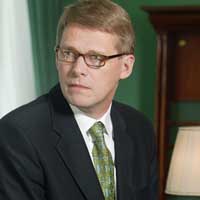Finnish premier 'confident' he can form new government
Prime Minister Matti Vanhanen's Center Party began post-election talks Monday to form a new coalition government probably based on a center-right axis with the opposition Conservatives.

The centrists narrowly won Sunday's parliamentary vote to remain the biggest group in Parliament by a one-seat margin over the Conservative Party, which posted the strongest gains.
The left-leaning Social Democrats, meanwhile, dropped eight seats in the 200-member assembly and were expected to lose their place in the governing coalition.
"I'm confident that I will be able to form the next government," Vanhanen told reporters Monday after initial talks with party leaders. "The biggest party will always find friends."
Most analysts predicted Vanhanen would throw out the Social Democrats and invite the Conservatives to form a new Cabinet that could also include smaller parties, such as the Greens or the Swedish People's Party.
"It's a clear result, the Social Democrats are out," the Iltalehti tabloid said.
However, any government shift was not expected to yield major changes in the country of 5.3 million, where there is broad agreement on most policies, including on maintaining Finland's neutrality and its welfare system financed by high taxes.
Vanhanen would not rule out any partners after meeting the Social Democrats, the Conservatives, the Swedish People's Party and the Greens. He said he would prefer a coalition with about 120 seats in Parliament, but added a left-right government with the three biggest parties was not an option.
Coalition talks "will be quite difficult, but I'm sure we'll manage them," Vanhanen said, adding that the composition of the new coalition should be ready next month. He declined to discuss policy or division of Cabinet seats.
Conservative Party Secretary Taru Tujunen was upbeat about the prospects of the conservatives being included in the next coalition.
"I'm sure it will be possible to form a government in this country based on the election result," she said. "There's no more drama involved this time than at any other time in the past."
Vanhanen declared victory late Sunday after a full vote count showed his Center Party won 51 seats, down four from the last election in 2003. Conservative leader Jyrki Katainen also celebrated the result, which gave his party 10 new seats for 50, saying the party could not "sidelined from government talks."
Social Democratic leader Eero Heinaluoma was disappointed after the party's worst election result since 1962. "Our message did not get across to the voters well enough," he said.
SDP Party Secretary Maarit Feldt-Ranta did not rule out that the party could stay in government, but said it was up to the centrists to decide. "The ball is in their court," she said.
The new Parliament will convene next week, and on April 17 lawmakers are to choose a prime minister. Two days later, President Tarja Halonen is expected to name the new Cabinet.
Finns elected a record 84 women into the assembly or 42 percent 100 years after becoming the first country worldwide to let women run for Parliament.
Finland has a booming economy and consistently ranks high in international surveys on competitiveness. High unemployment has dropped to the European Union average under Vanhanen's government 7.6 percent in January but critics say he has failed to improve health care.
Pensions and care for the elderly were among the main election issues in a country where the proportion of people aged 65 or older has reached 15 percent, from 7 percent in the 1950s.
The campaigns of the main parties were fairly similar, leading to criticism that politicians failed to present clear alternatives, reports AP.
Voter turnout dropped to 68 percent of the 4.3 million electorate, the lowest since World War II.
Subscribe to Pravda.Ru Telegram channel, Facebook, RSS!


